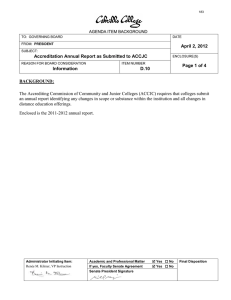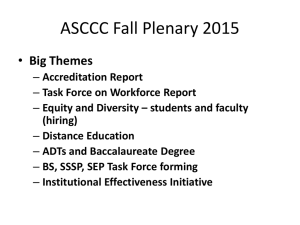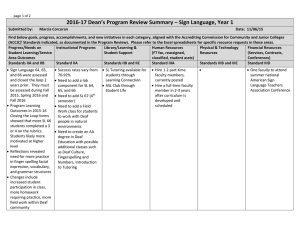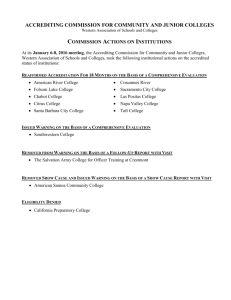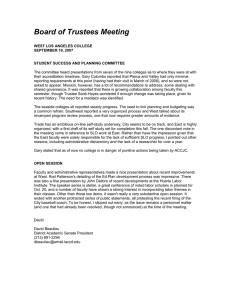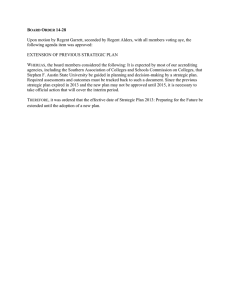P S E
advertisement
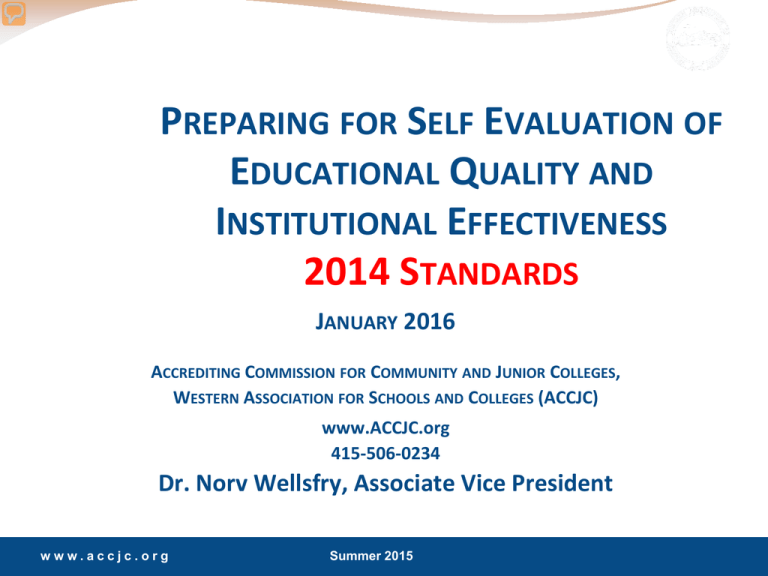
Accrediting Commission for Community and Junior Colleges Western Association of Schools and Colleges PREPARING FOR SELF EVALUATION OF EDUCATIONAL QUALITY AND INSTITUTIONAL EFFECTIVENESS 2014 STANDARDS JANUARY 2016 ACCREDITING COMMISSION FOR COMMUNITY AND JUNIOR COLLEGES, WESTERN ASSOCIATION FOR SCHOOLS AND COLLEGES (ACCJC) www.ACCJC.org 415-506-0234 Dr. Norv Wellsfry, Associate Vice President www.accjc.org Summer 2015 Accrediting Commission for Community and Junior Colleges Western Association of Schools and Colleges THE 2014 ACCREDITATION STANDARDS: A FOCUS ON QUALITY AND IMPROVEMENT QUALITY is those institutional characteristics and processes that support and improve student learning and student achievement to achieve the institutional mission www.accjc.org Summer 2015 2 Accrediting Commission for Community and Junior Colleges Western Association of Schools and Colleges • • • • • • • • • TODAY’S SESSION Accreditation and the ACCJC The Self Evaluation of Educational Quality and Institutional Effectiveness Report (Self Evaluation Report) and Resources The Requirements for evidence in Institutional Self Evaluation The Eligibility Requirements and Accreditation Standards Evaluating compliance with USDE regulations and Commission policies Organizing the college for self evaluation and ACCJC resources Format of the Self Evaluation Report The Quality Focus Essay (New) The site visit www.accjc.org Summer 2015 3 Accrediting Commission for Community and Junior Colleges Western Association of Schools and Colleges WHY DO WE CARE ABOUT ACCREDITATION? • • • Accreditation focuses an institution on those elements of institutional operations that support students and learning Accreditation holds us to high standards for our work and our institution’s outcomes Accreditation reviews validate and focus the hard work we do to educate students www.accjc.org Summer 2015 4 Accrediting Commission for Community and Junior Colleges Western Association of Schools and Colleges PURPOSES OF ACCREDITATION • • • Quality assurance to the public and students, federal and state governments Improve the effectiveness of higher education (Move the bar) Institutional improvement for educational excellence www.accjc.org Summer 2015 5 Accrediting Commission for Community and Junior Colleges Western Association of Schools and Colleges PURPOSES OF ACCREDITATION • Continuous promotion of institutional improvement beyond meeting Standards The Standards require institutions to seek ways to improve outcomes (I.B.1, I.B.3, I.B.6, I.B.9,) Actionable Improvement Plans (formerly Planning Agendas) that derive from the self evaluation process Quality Focus Essay that identifies 2-3 action projects that have potential for institutional improvement www.accjc.org Summer 2015 6 Accrediting Commission for Community and Junior Colleges Western Association of Schools and Colleges ORGANIZATION OF ACCREDITATION • • • • Accrediting agencies are membership organizations with requirements of “members” Accreditors evaluate the whole institution and are organized by geographic regions – hence, Western Association, Southern Association, etc. Accreditation is non-governmental, peer review Accreditation is voluntary-institutions voluntarily submit to requirements, evaluators are volunteers www.accjc.org Summer 2015 7 Accrediting Commission for Community and Junior Colleges Western Association of Schools and Colleges FACT OR MYTH? “Accreditation Standards are written with little input from ACCJC member institutions.” www.accjc.org Summer 2015 8 Accrediting Commission for Community and Junior Colleges Western Association of Schools and Colleges HOW DOES ACCREDITATION WORK? 1. 2. Establish standards of quality based on excellent practices in higher education Evaluate institutions with these standards using a three-part, peer review process that entails: -institutional self evaluation (internal) -team review (external) -Commission review Continued www.accjc.org Summer 2015 9 Accrediting Commission for Community and Junior Colleges Western Association of Schools and Colleges HOW DOES ACCREDITATION WORK? • The Commission reviews institutions and acts as a decision and policy-making body • Institutions are required to make all reports and action letters available to the public • The ACCJC communicates accrediting decisions to the institution • Governmental agencies and the public are notified of Accredited status (ACCJC News, Website Directory) www.accjc.org Summer 2015 10 Accrediting Commission for Community and Junior Colleges Western Association of Schools and Colleges COMMISSION ACTION ON INSTITUTIONS • Current Policy on Commission Actions on Institutions Reaffirm Accreditation Reaffirm Accreditation (for a limited period) and require a Follow-Up Report Sanctions Warning Probation Show Cause www.accjc.org Summer 2015 11 Accrediting Commission for Community and Junior Colleges Western Association of Schools and Colleges SOME RESOURCES FOR SELF EVALUATION COMMITTEES AND WRITING TEAMS (Available on ACCJC.org website) www.accjc.org Summer 2015 12 Accrediting Commission for Community and Junior Colleges Western Association of Schools and Colleges ACCJC PUBLICATIONS TO SUPPORT THE SELF EVALUATION PROCESS www.accjc.org Summer 2015 13 Accrediting Commission for Community and Junior Colleges Western Association of Schools and Colleges www.accjc.org Summer 2015 14 Accrediting Commission for Community and Junior Colleges Western Association of Schools and Colleges RELATIONSHIP OF ONGOING INSTITUTIONAL QUALITY REVIEW TO SELF EVALUATION AR/AFR AR/AFR Year 3 www.accjc.org AR/AFR Year 1 Institutional Evaluation and Planning MidCycle Report Year 3.5 AR = ANNUAL REPORT AR/AFR Year 2 Self Evaluation Year 7 AR/AFR AR/AFR AR/AFR AR/AFR Year 4 Year 5 Year 6 AFR = ANNUAL FISCAL REPORT Summer 2015 Accrediting Commission for Community and Junior Colleges Western Association of Schools and Colleges STAGES OF SELF EVALUATION • Organization • Identification of necessary data/evidence • Collection of Data/evidence • Analysis of Data/evidence • Conclusions and initial narrative • Final narrative (One Voice) - ISER www.accjc.org Summer 2015 16 Accrediting Commission for Community and Junior Colleges Western Association of Schools and Colleges ESTABLISH STRUCTURES AND PROCESSES FOR SELF EVALUATION THAT ENSURE • • • • • The institution is meeting its mission and how it knows this Evaluation against ERs, Accreditation Standards, and relevant Commission policies, and federal regulations The evaluation is holistic, integrated, and honest The self evaluation uses and is integrated with ongoing research, evaluation, and planning Self Evaluation leads to institution-wide reflection about quality and student learning/achievement based on data and analyses www.accjc.org Summer 2015 17 Accrediting Commission for Community and Junior Colleges Western Association of Schools and Colleges The Self Evaluation Report of Educational Quality and Institutional Effectiveness Institutional Self Evaluation Report ISER www.accjc.org Summer 2015 18 Accrediting Commission for Community and Junior Colleges Western Association of Schools and Colleges THE SELF EVALUATION REPORT • Summarizes and references evidence to support its • • • analyses, and makes the evidence available electronically to the team and the Commission Has coherence and a single voice Is a meaningful document for the college, the team, and the Commission Leads to institution-wide reflection about quality and student learning www.accjc.org Summer 2015 19 Accrediting Commission for Community and Junior Colleges Western Association of Schools and Colleges PURPOSES OF THE SELF EVALUATION REPORT • To provide an honest written analysis of the institution’s strengths and weaknesses in meeting Eligibility Requirements, Accreditation Standards, Commission policies, and federal regulations based on the institution’s current status, continuous self evaluation, and quality improvement activities Continued www.accjc.org Summer 2015 20 Accrediting Commission for Community and Junior Colleges Western Association of Schools and Colleges PURPOSES OF THE SELF EVALUATION REPORT C ONTINUED Identify areas at the institution that: • • • Are Institutional Strengths (What Works) • Need attention for improvement (What can work better) • Include in the Self Evaluation Report (actionable improvement plans & QFE) Present evidence of student achievement and learning [results, analysis of the results, use of results at the course, program, and institutional level] www.accjc.org Summer 2015 21 Accrediting Commission for Community and Junior Colleges Western Association of Schools and Colleges PURPOSES OF THE SELF EVALUATION REPORT C ONTINUED • Information for the external evaluation team: • Reflective demonstration of meeting the Standards with – Information, evidence and analysis of current conditions • Demonstration that the institution can improve its own quality and effectiveness www.accjc.org Summer 2015 22 Accrediting Commission for Community and Junior Colleges Western Association of Schools and Colleges QUESTIONS FOR WRITING TEAMS: 1. What should be done if there is no evidence of the college practice in meeting a particular Standard? 2. What should be done if the self evaluation reveals an area where the college isn’t meeting a particular Standard? www.accjc.org Summer 2015 23 Accrediting Commission for Community and Junior Colleges Western Association of Schools and Colleges TOP 4 INDICATORS THE SELF EVALUATION HAS VEERED OFF TRACK 4. The writers have decided to leave it to the visiting team to ask questions if there are any gaps in narrative/evidence. 3. There are disputes over the facts that remain unresolved. 2. The evidence is a deluge of material; not selected for its value in demonstrating how the college itself assesses/conducts its practice in a particular area. 1. The self evaluation process is not integrated with institutional practices as a part of ongoing evaluation. www.accjc.org Summer 2015 24 Accrediting Commission for Community and Junior Colleges Western Association of Schools and Colleges THE REQUIREMENTS FOR EVIDENCE IN THE SELF EVALUATION REPORT www.accjc.org Summer 2015 25 Accrediting Commission for Community and Junior Colleges Western Association of Schools and Colleges DATA AND EVIDENCE • Data: qualitative and/or quantitative information • Data and data analysis: • • referenced in the report narrative source material in evidence • Provide verification of a particular action or existing condition • What is evidence? Policies, operational documents, minutes, reports, research and analysis, screen captures from websites, and other sources of information www.accjc.org Summer 2015 26 Accrediting Commission for Community and Junior Colleges Western Association of Schools and Colleges DATA IN THE SELF EVALUATION REPORT • Must be accurate, up-to-date, reliable, valid, and • • • • significant Qualitative and/or quantitative (data tables, charts and graphs or in documentary form. Analysis is also essential) Longitudinal where appropriate Disaggregated by relevant sub-populations defined by the institution Available to the ACCJC and evaluation team in electronic form (USB / Memory Stick) www.accjc.org Summer 2015 27 Accrediting Commission for Community and Junior Colleges Western Association of Schools and Colleges STUDENT ACHIEVEMENT DATA (MUST BE INCLUDED) • Course completion rates • Degree/Certificates awarded (numbers or rates) • Transfer rates to four-year institutions • For CTE program completers: • • Licensure/certification exam pass rates Job Placement Data www.accjc.org Summer 2015 28 Accrediting Commission for Community and Junior Colleges Western Association of Schools and Colleges STUDENT ACHIEVEMENT DATA • Other measures of student achievement relevant to the institutional mission • Measures of student achievement relevant to a particular program • Trend Data over multiple years www.accjc.org Summer 2015 29 Accrediting Commission for Community and Junior Colleges Western Association of Schools and Colleges INSTITUTION-SET STANDARDS THE INSTITUTION MUST DEMONSTRATE THAT IT: • Establishes standards for its own performance in • • • student achievement (Institution-set standards) Analyzes how well it is meeting its own standards Makes results available to all constituent groups Plans to improve in areas where its own performance is less than adequate Standard I.B.3 3.3 in Manual for Institutional Self Evaluation (pg.12) www.accjc.org Summer 2015 30 Accrediting Commission for Community and Junior Colleges Western Association of Schools and Colleges STUDENT ACHIEVEMENT STANDARD II.B.4: THE INSTITUTION ESTABLISHES INSTITUTION-SET STANDARDS FOR STUDENT ACHIEVEMENT, APPROPRIATE TO ITS MISSION, ASSESSES HOW WELL IT IS ACHIEVING THEM IN PURSUIT OF CONTINUOUS IMPROVEMENT, AND PUBLISHES THIS INFORMATION. (ER 11) HOW SHOULD THIS DATA BE PRESENTED? MANUAL FOR INSTITUTIONAL SELF EVALUATION APPENDIX G www.accjc.org Summer 2015 31 Accrediting Commission for Community and Junior Colleges Western Association of Schools and Colleges Presentation of Student Achievement Data Appendix G – Manual for Institutional Self Evaluation Data Element Course Completion Rate* Definition of the measure Applies to all students: Successful course completion, grade C or better if graded, over the number of students enrolled when the general enrollment period ends.* www.accjc.org InstitutionSet Standard Stretch Goal ** *** Summer 2015 Most Recent Year’s Performance Previous Year ____ Performance Multi-year average Add columns for the number of years being tracked (generally 3 to 5 prior years) (generally 3-6 years) Use for multiyear trend analysis 32 Accrediting Commission for Community and Junior Colleges Western Association of Schools and Colleges EXTERNAL EVALUATION TEAMS WILL: • Identify the institution-set standards for student • • • • • achievement Evaluate the appropriateness of these standards Consider these standards in relation to college mission Review and describe the data and analyze the college’s performance Describe the institution’s overall performance Determine whether the college is meeting its standards www.accjc.org Summer 2015 33 Accrediting Commission for Community and Junior Colleges Western Association of Schools and Colleges DATA ON PROGRAM REVIEW • • • • • Policies on curriculum review and implementation Evaluation of student learning outcomes Connection and correlation of program review with institutional planning (elements/timelines) Program review data usage (levels and cycles) Actions taken (improvements) on the basis of program review www.accjc.org Summer 2015 34 Accrediting Commission for Community and Junior Colleges Western Association of Schools and Colleges DATA ON STUDENT SUPPORT SERVICES • Program reviews • Student satisfaction/follow-up surveys • Records of student use of support services • Student loan default rates • Student support services planning documents Continued www.accjc.org Summer 2015 35 Accrediting Commission for Community and Junior Colleges Western Association of Schools and Colleges STUDENT SUPPORT SERVICES (CONT) • Catalog, handbook, web-page descriptions of student services • Policies on academic progress, honesty, codes of conduct, grievance and complaint procedures • Availability of student support services to offcampus and to Distance Education/Correspondence Education students www.accjc.org Summer 2015 36 Accrediting Commission for Community and Junior Colleges Western Association of Schools and Colleges DATA EVALUATION BY THE VISITING TEAM • Determine that the College: Gathers data routinely and systematically Analyzes and reflects upon it Publishes it and shares it widely with constituent groups (for example: research reports, fact books) Uses it to plan and implement program and institutional improvements Evaluates the effectiveness of its improvements www.accjc.org Summer 2015 37 Accrediting Commission for Community and Junior Colleges Western Association of Schools and Colleges QUESTIONS FOR DISCUSSION Standard II.B.4: The institution defines and assesses student learning outcomes for all instructional programs and student and learning support services. (ER 11) What evidence should be examined for the ISER? www.accjc.org Summer 2015 38 Accrediting Commission for Community and Junior Colleges Western Association of Schools and Colleges EVIDENCE ON STUDENT LEARNING OUTCOMES: • Course outlines/syllabi with SLOs, catalog descriptions of program level • • • • outcomes, examples of assessment methods used (rubrics, portfolios, others), mapping, documented cycle. Institutional, general education, and specialization area outcomes in program outcomes/assessment Summary assessment data on SLO attainment Information about the level of participation in SLO assessment in all programs of the institution Information about how SLOs and results data are made known to students and the public, and how they are used by students Evidence of how SLO assessment results are communicated across the college and used for planning, resource allocation, and improvement at the course/program levels as well as at the institutional level What else would you include? www.accjc.org Summer 2015 39 Accrediting Commission for Community and Junior Colleges Western Association of Schools and Colleges TEAMS AND COMMISSIONERS WANT EVIDENCE ! WHAT, WHERE, WHEN • Access to Password protected information – Early • • • (Don’t wait to the last minute) Elimination of irrelevant, poor quality evidence or deluge of data (waste of the team’s time) Evidence should be “frozen” at the point of the team’s visit, provided on a memory stick (beware the BROKEN LINK) Bookmark/Pointers to relevant, specific data points within large documents www.accjc.org Summer 2015 Continued 40 Accrediting Commission for Community and Junior Colleges Western Association of Schools and Colleges COMMENTS FROM TEAMS AND COMMISSIONERS ABOUT EVIDENCE • Evidence after the team’s visit cannot be verified by • on-sight observation (Non-data) Evidence should be available until after the institution receives the Commission action letter (Teams and COMMISSIONERS WILL review data after the visit) www.accjc.org Summer 2015 41 Accrediting Commission for Community and Junior Colleges Western Association of Schools and Colleges THE ELIGIBILITY REQUIREMENTS www.accjc.org Summer 2015 42 Accrediting Commission for Community and Junior Colleges Western Association of Schools and Colleges FACT OR MYTH? “We should be safe if we copy those short paragraphs we used before about our compliance with the Eligibility Requirements.” www.accjc.org Summer 2015 43 Accrediting Commission for Community and Junior Colleges Western Association of Schools and Colleges FACT OR MYTH? “Have you heard? We don’t even need to write a section on each of the Eligibility Requirements!.” www.accjc.org Summer 2015 44 Accrediting Commission for Community and Junior Colleges Western Association of Schools and Colleges ELIGIBILITY REQUIREMENTS (ERS) EVALUATION UNDER 2014 STANDARDS • The first 5 criteria must be separately addressed in the Self Evaluation Report. The others are woven into the institution’s narrative and evidence on the Standards. (BIG 5) ER 1: Authority ER 2: Operational Status ER 3: Degrees ER 4: Chief Executive Officer ER 5: Financial Accountability See Accreditation Reference Handbook www.accjc.org Summer 2015 45 Accrediting Commission for Community and Junior Colleges Western Association of Schools and Colleges REMAINING ER’S INTEGRATED INTO 2014 STANDARDS For Example: • Standard I.A.1 and I.A.6 cross reference ER 6 • Standard I.B.2 and I.B.3 cross reference ER 11 • Standard I.B.9 cross references ER 19 (Compliance verified during Comprehensive Evaluation visit) www.accjc.org Summer 2015 46 Accrediting Commission for Community and Junior Colleges Western Association of Schools and Colleges THE 2014 ACCREDITATION STANDARDS www.accjc.org Summer 2015 47 Accrediting Commission for Community and Junior Colleges Western Association of Schools and Colleges STANDARD I: MISSION, ACADEMIC QUALITY AND INSTITUTIONAL EFFECTIVENESS, AND INTEGRITY A. Mission B. Assuring Academic Quality and Institutional Effectiveness C. Institutional Integrity (New subsection/consolidation www.accjc.org Summer 2015 48 Accrediting Commission for Community and Junior Colleges Western Association of Schools and Colleges KEY ELEMENTS OF STANDARD I • Quality Key processes that lead to improvements • Mission How does Mission drive planning Can Mission be assessed • Data Analysis of quantitative and qualitative data provides basis for evaluations www.accjc.org Summer 2015 49 Accrediting Commission for Community and Junior Colleges Western Association of Schools and Colleges KEY ELEMENTS OF STANDARD I (CONT) • Institution Set Standards New federal requirements (not ACCJC invention) Institutional (completion, placement, transfer) and program (CTE) • Disaggregation Sub-populations of students (critical to mission) Identify performance gaps; strategies to address • Broad Communication Results of assessment and evaluation – to public www.accjc.org Summer 2015 50 Accrediting Commission for Community and Junior Colleges Western Association of Schools and Colleges FACT OR MYTH? The fact that we continue to exist as a college shows we operate in alignment with our mission. www.accjc.org Summer 2015 51 Accrediting Commission for Community and Junior Colleges Western Association of Schools and Colleges STANDARD II: STUDENT LEARNING PROGRAMS AND SUPPORT SERVICES A. B. C. Instructional Programs Library and Learning Support Services Student Support Services www.accjc.org Summer 2015 52 II.A – INSTRUCTIONAL PROGRAMS Accrediting Commission for Community and Junior Colleges Western Association of Schools and Colleges II.A.1: All instructional programs • • regardless of location or means of delivery, fields of study consistent with the mission and appropriate to higher education Culminate in student attainment of identified student learning outcomes, and achievement of degrees, certificates, employment, or transfer. (ACCJC Eligibility Requirement ER 9 and ER 11) o New emphasis on student attainment and achievement www.accjc.org Summer 2015 53 Accrediting Commission for Community and Junior Colleges Western Association of Schools and Colleges II.A.9. Student Learning Outcomes • Credit awarded for courses, degrees and certificates based on student attainment of learning outcomes. • Units of credit awarded are consistent with institutional policies that reflect generally accepted norms or equivalencies in higher education. • Courses based on clock hours follow Federal standards for clock-to-credit-hour conversions. (ER 10) o This requirement, which has existed previously in policy, and in federal regulations, has now been added to the standards. www.accjc.org Summer 2015 54 Accrediting Commission for Community and Junior Colleges Western Association of Schools and Colleges II.A.16. Program Review • Regularly evaluation and improvement in the quality and currency of all instructional programs offered in the name of the institution. Includes collegiate, pre-collegiate, career-technical, and continuing and community education courses and programs, regardless of delivery mode or location. • The institution systematically strives to improve programs and courses to enhance learning outcomes and achievement of students. o o Not new, but notice the specific reference to continuing and community education courses. The assessment and evaluation in some types of courses or programs may look different from that used for most instructional programs. www.accjc.org Summer 2015 55 Accrediting Commission for Community and Junior Colleges Western Association of Schools and Colleges II.C.2. The institution identifies and assesses learning support outcomes for its student population and provides appropriate student support services and programs to achieve those outcomes. The institution uses assessment data to continuously improve student support programs and services. www.accjc.org Summer 2015 56 Accrediting Commission for Community and Junior Colleges Western Association of Schools and Colleges II.C.4. Co-curricular programs and athletic programs are suited to the institution's mission and contribute to the social and cultural dimensions of the educational experience of its students. If the institution offers cocurricular or athletic programs, they are conducted with sound educational policy and standards of integrity. The institution has responsibility for the control of these programs, including their finances. o o A new standard. Note the linkage of co-curricular programs and athletics programs to the institution’s mission. www.accjc.org Summer 2015 57 Accrediting Commission for Community and Junior Colleges Western Association of Schools and Colleges STANDARD III: RESOURCES A. Human Resources B. Physical Resources C. Technology Resources D. Financial Resources www.accjc.org Summer 2015 58 Accrediting Commission for Community and Junior Colleges Western Association of Schools and Colleges FACT OR MYTH? This portion of the standards is more about operations than it is about student learning and achievement. [Don’t we only need the HR, Tech, Facilities, and Finance “gurus” on these sections?] www.accjc.org Summer 2015 59 Accrediting Commission for Community and Junior Colleges Western Association of Schools and Colleges STANDARD III THEMES OF CHANGES • Improve clarity • Improve planning Recognize role and importance of part-time and adjunct faulty in processes Expand recognition of comprehensive nature of planning considerations (TCO) • Reorganize and restructure (especially III.D) www.accjc.org Summer 2015 60 Accrediting Commission for Community and Junior Colleges Western Association of Schools and Colleges III.A: HUMAN RESOURCES • III.A.5: The institution assures the effectiveness of its human resources by evaluating all personnel systematically and at stated intervals. …. Evaluation processes seek to assess effectiveness of personnel and encourage improvement. Actions taken following evaluations are formal, timely, and documented. www.accjc.org Summer 2015 61 Accrediting Commission for Community and Junior Colleges Western Association of Schools and Colleges III.D: FINANCIAL RESOURCES • Restructure for Clarity Planning (1-3) Fiscal Responsibility and Stability (4-10) Liabilities (11-15) Contractual Agreements (16) www.accjc.org Summer 2015 62 Accrediting Commission for Community and Junior Colleges Western Association of Schools and Colleges STANDARD IV: LEADERSHIP AND GOVERNANCE A. Decision-Making Roles and Processes B. Chief Executive Officer C. Governing Board D. Multi-College Districts or Systems www.accjc.org Summer 2015 63 Accrediting Commission for Community and Junior Colleges Western Association of Schools and Colleges • IV.C. 8: • To ensure the institution is accomplishing its goals for student success, the governing board regularly reviews key indicators of student learning and achievement and institutional plans for improving academic quality. (NEW) IV.C. 10: Board policies and/or bylaws clearly establish a process for board evaluation. …. The results are used to improve board performance, academic quality, and institutional effectiveness. www.accjc.org Summer 2015 64 Accrediting Commission for Community and Junior Colleges Western Association of Schools and Colleges FACT OR MYTH? In California, if we follow AB 1725, we have no problem with the governance part of the standards. www.accjc.org Summer 2015 65 Accrediting Commission for Community and Junior Colleges Western Association of Schools and Colleges EVALUATION TEAM RESPONSIBILITIES COMMISSION POLICIES U.S. DEPARTMENT OF EDUCATION (USDE) REGULATIONS www.accjc.org Summer 2015 66 Accrediting Commission for Community and Junior Colleges Western Association of Schools and Colleges • • • • • • • • USDE REGULATIONS (CHECKLIST) Notification of evaluation visit and third party comment Institution-set standards and performance with respect to student achievement Credits, program length, and tuition (clock to credit hour conversion – see Appendix I) Transfer policies Distance education and correspondence education Student complaints Institutional disclosure and advertising, and recruitment materials Title IV compliance www.accjc.org Summer 2015 67 Accrediting Commission for Community and Junior Colleges Western Association of Schools and Colleges Student Complaints Evaluation Items: SAMPLE CHECKLIST _____ The institution has clear policies and procedures for handling student complaints, and the current policies and procedures are accessible to students in the college catalog and online. _____ The student complaint files for the previous six years (since the last comprehensive evaluation) are available; the files demonstrate accurate implementation of the complaint policies and procedures. _____ The team analysis of the student complaint files identifies any issues that may be indicative of the institution’s noncompliance with any Accreditation Standards. _____ The institution posts on its website the names of associations, agencies and govern mental bodies that accredit, approve, or license the institution and any of its programs, and provides contact information for filing complaints with such entities. _____ The institution demonstrates compliance with the Commission Policy on Representation of Accredited Status and the Policy on Student and Public Complaints Against Institutions. [Regulation citations: 602.16(a)(1)(ix); 668.43.] Conclusion Check-Off (mark one): _____ The team has reviewed the elements of this component and has found the institution to meet the Commission’s requirements. _____ The team has reviewed the elements of this component and has found the institution to meet the Commission’s requirements, but that follow-up is recommended. _____ The team has reviewed the elements of this component and found the institution does not meet the Commission’s requirements. Narrative (add space as needed): www.accjc.org Summer 2015 68 Accrediting Commission for Community and Junior Colleges Western Association of Schools and Colleges COMMISSION POLICIES • • • • • • • • Rights and Responsibilities (related to third-party comment) Institutional Degrees and Credits Distance Education and Correspondence Education Representation of Accredited Status Student and Public Complaints Against Institutions Institutional Advertising, Student Recruitment, and Representation of Accredited Status Institutional Compliance with Title IV Contractual Relationships with Non-Regionally Accredited Organizations See Checklist www.accjc.org Summer 2015 69 Accrediting Commission for Community and Junior Colleges Western Association of Schools and Colleges FACT OR MYTH? The list of Commission policies we just reviewed covers all the policies a college needs to know about and follow. www.accjc.org Summer 2015 70 Accrediting Commission for Community and Junior Colleges Western Association of Schools and Colleges ORGANIZING THE COLLEGE FOR INSTITUTIONAL SELF EVALUATION www.accjc.org Summer 2015 71 Accrediting Commission for Community and Junior Colleges Western Association of Schools and Colleges FORMAT OF THE SELF EVALUATION REPORT AND SITE VISIT www.accjc.org Summer 2015 72 Accrediting Commission for Community and Junior Colleges Western Association of Schools and Colleges FORMAT FOR THE REPORT • Cover Sheet • Certification of the Report • Table of Contents • Structure of the report A. Introduction (history, demographic information, location of off-site campuses, major developments since the last comprehensive review) B. Presentation of student achievement data and institutionset standards C. Organization of the self evaluation process *See Manual for Institutional Self Evaluation Continued www.accjc.org Summer 2015 73 Accrediting Commission for Community and Junior Colleges Western Association of Schools and Colleges FORMAT FOR THE REPORT D. Institutional Organization (organizational chart, E. F. Eligibility Requirements (1-5) Commission policies and Federal regulations G. Institutional Analysis of the Accreditation Standards: functional map, list of off-campus sites, DE/CE) (Checklist) Evidence of Meeting the Standard Analysis and Evaluation (Whether or not, and to what degree does evidence demonstrate that the institution meets each Standard? How has the institution reached this conclusion?) Actionable Improvement Plans (see note next slide) Continued www.accjc.org Summer 2015 74 Accrediting Commission for Community and Junior Colleges Western Association of Schools and Colleges FORMAT FOR THE REPORT INSTITUTIONAL SELF EVALUATION USING THE ACCREDITATION STANDARDS • Actionable Improvement Plans: Changes made during self evaluation process and plans for future action (formerly Planning Agendas) can be made to meet Standards or to improve beyond the Standard www.accjc.org Summer 2015 75 Accrediting Commission for Community and Junior Colleges Western Association of Schools and Colleges H. QUALITY FOCUS ESSAY New Component For Self Evaluation Report (NAPA COLLEGE – Self-Evaluation Report pp 381-399) www.accjc.org Summer 2015 76 Accrediting Commission for Community and Junior Colleges Western Association of Schools and Colleges QUALITY FOCUS ESSAY • In the Quality Focus Essay (QFE), the college will • discuss, in essay format, two or three areas it has identified for further study, improvement, and enhancement of academic quality, institutional effectiveness, and excellence. The QFE topics (action projects) are selected during the college’s self evaluation process. Continued www.accjc.org Summer 2015 77 Accrediting Commission for Community and Junior Colleges Western Association of Schools and Colleges QUALITY FOCUS ESSAY • Is related to the Accreditation Standards • Is realistic, coming out of data and reflected in the • • • self evaluation process and Self Evaluation Report Has a 5,000 word limit Sets multi-year, long-term direction(s) for the college Demonstrates institutional commitment to excellence Continued www.accjc.org Summer 2015 78 Accrediting Commission for Community and Junior Colleges Western Association of Schools and Colleges QUALITY FOCUS ESSAY The Midterm Report will be an update on the quality improvement efforts (action projects), and an analysis of trend data (AR/AFR, etc.) related to institutional performance. See ACCJC News article: “Accreditation Asks for a Focus beyond Compliance to Quality Improvement” ACCJC Newsletter – Spring/Summer 2015 www.accjc.org Summer 2015 79 Accrediting Commission for Community and Junior Colleges Western Association of Schools and Colleges QUALITY FOCUS ESSAY • Task for Self Evaluation Visiting Team Review the Quality Focus Essay (QFE) Provide constructive feedback Focus on goal: Supporting institutional efforts to enhance student learning and achievement www.accjc.org Summer 2015 80 Accrediting Commission for Community and Junior Colleges Western Association of Schools and Colleges I. FORMAT FOR THE REPORT (FINAL) Changes and Plan Arising out of the SelfEvaluation Process Include changes made during the self evaluation process and plans for future action in the Self Evaluation Report. Include any timelines for implementation and expected outcomes. Suggested: Develop a chart summarizing changes made in response to its self evaluation process and future actions planned (Assists institutional tracking and monitoring) www.accjc.org Summer 2015 81 Accrediting Commission for Community and Junior Colleges Western Association of Schools and Colleges THE SITE VISIT • Pre-visit by team chair • Documents for the team • Team room and other facilities • Open meetings • Availability of key personnel • Classroom and off-site visits • Access to distance education • Exit report • The college should not make gifts to team members www.accjc.org Summer 2015 82 Accrediting Commission for Community and Junior Colleges Western Association of Schools and Colleges Read the previous evaluation team and college reports www.accjc.org Summer 2015 83 Accrediting Commission for Community and Junior Colleges Western Association of Schools and Colleges SUBMISSION OF THE SELF EVALUATION REPORT • To the ACCJC: One electronic copy (with evidence) in Microsoft Word plus one printed copy; electronic copies and 1 printed copy of the catalog and schedule of classes (if available in print format) • To each Evaluation Team Member: One electronic copy (with evidence in on memory stick), including catalog and class schedule. Special accommodation for disabilities may call for additional print copies. www.accjc.org Summer 2015 84 Accrediting Commission for Community and Junior Colleges Western Association of Schools and Colleges OPEN DISCUSSION What questions do you have about the ERs or Standards, the self evaluation process, the Self Evaluation Report, Commission Policies, The Checklist, federal regulations, external evaluation visit, or what happens after the visit ? www.accjc.org Summer 2015 85 Accrediting Commission for Community and Junior Colleges Western Association of Schools and Colleges ACCREDITING COMMISSION FOR COMMUNITY AND JUNIOR COLLEGES WESTERN ASSOCIATION OF SCHOOLS AND COLLEGES 10 Commercial Blvd. Suite 204 Novato, CA 94949 415-506-0234 FAX: 415-506-0238 Website: www.accjc.org Email: accjc@accjc.org www.accjc.org Summer 2015 86
